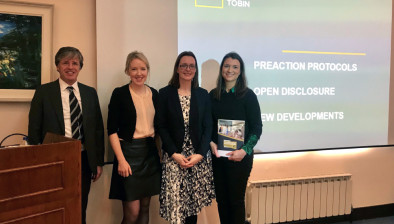Court of Appeal: Dismissal of medical negligence claim with no expert report after eight years upheld

The Court of Appeal has upheld the dismissal of a clinical negligence claim in circumstances where no expert report had been obtained by the plaintiff’s solicitors almost eight years after the proceedings had issued.

About this case:
- Citation:[2024] IECA 17
- Judgment:
- Court:Court of Appeal
- Judge:Mr Justice Seamus Noonan
Delivering judgment for the Court of Appeal, Mr Justice Seamus Noonan denounced the conduct of the case as a “gross abuse of process”, commenting that the plaintiff could not avoid responsibility for the actions of her solicitors “by seeking to visit the consequences on the defendant… If the plaintiff’s solicitors failed in their duty to her as their client, it is to them she must look for a remedy.”
Background
On 7 December 2015, the plaintiff issued personal injuries proceedings claiming that during her childhood she underwent surgery to insert an internal fixation device to realign her right lower leg and from November 2011 onwards, suffered from swelling and pain in that leg leading to multiple infections and hospitalisations in St James’s Hospital.
The plaintiff pleaded that on 3 November 2013, she had a staple removed from her right distal tibia under the care of Mr Peter McKenna, which alleviated her symptoms. On that basis, the plaintiff claimed that the infection and related symptoms that she suffered in the period from November 2011 to the date of the surgery were attributable to the defendant’s failure to identify the staple as the cause of her symptoms and to remove it at an earlier point.
The plaintiff’s original solicitors initially issued proceedings against the wrong defendant, amending the proceedings over a year after the defendant’s solicitors had advised them to. The defendant’s notice for particulars and notice requiring further information went completely ignored by the plaintiff’s solicitors.
The defendant issued a motion to dismiss the proceedings for want of prosecution on 17 December 2021, and the plaintiff’s new solicitors served a notice of change of solicitor on 14 March 2022.
An affidavit sworn by the plaintiff’s new solicitor almost seven years after the initiation of the proceedings revealed that the original ‘childhood’ surgery was carried out in the year 2000, and that the plaintiff’s previous solicitors had not obtained any expert report supporting her allegations of clinical negligence by the time that the matter came before the High Court.
The High Court
Mr Justice Mark Heslin criticised the conduct of the plaintiff’s claim, referring to Rooney v HSE [2022] IEHC 132 in respect of the issuing of the plaintiff’s proceedings “without first ascertaining that there are reasonable grounds for so doing” and noting that the plaintiff’s claim was one in which a “late start” was made and that obliged the plaintiff to progress her case without delay.
The High Court found that there was no evidence to substantiate counsel’s contention that the plaintiff herself was completely blameless in respect of the delay and determined that the absence of a supporting medical report after such an expanse of time weighed heavily against the plaintiff.
The court found that at least moderate prejudice sufficient to dismiss the case under the Primor plc v Stokes Kennedy Crowley [1996] 2 IR 459 principles had arisen, and that the O’Domhnaill v Merrick [1984] IR 151 test was met in that there was a serious risk that a fair trial would no longer be possible.
The plaintiff appealed to the Court of Appeal on grounds that the High Court erred in dismissing her claim where the defendant did not tender evidence to demonstrate that it was prejudiced by her delay and erred in holding that the prejudice suffered by the defendant tipped the balance of justice against the plaintiff.
The Court of Appeal
Mr Justice Noonan found the paucity of information on the summons “immediately striking”, noting that it was “entirely silent as to when the alleged failure is said to have occurred, where it occurred and who was responsible for that alleged failure”. The judge considered that the summons was so uninformative that it was practically impossible for the defendant to investigate the claim.
The court considered that appeal was highly unusual, finding that the failure on part of the plaintiff’s solicitors to obtain an expert report despite the length of time which had passed “is little short of staggering… Regrettably, it has to be said that the plaintiff has been badly served by her lawyers in this case, noting that she is now on her third set of solicitors.”
Agreeing with Simons J. in Rooney, Mr Justice Noonan considered that: “If there was any doubt about whether the commencement of these proceedings was an abuse of process without an expert report, their perpetuation for a further eight years, still without a report, is certainly an abuse of process.”
Noting that the plaintiff bore the onus of progressing her case without delay, the Court of Appeal observed that “quite the opposite occurred” and that: “It really beggars belief that after five years of inactivity, the first firm, when threatened with a motion to dismiss, did not even reply… the plaintiff’s current firm came on record in March 2022 having been instructed the previous month. At this juncture, the file was in crisis and required urgent action. Instead, a period of some seventeen months was allowed to elapse and still no expert report was obtained before the motion was heard.”
Considering the behaviour of the firms as “an alarming catalogue of failure and indolence”, the court opined that the plaintiff nonetheless cannot avoid responsibility for the actions of her solicitors “by seeking to visit the consequences on the defendant” opining that “subject to very limited exceptions, the act of a solicitor is the act of the client who retains the solicitor. If the plaintiff’s solicitors failed in their duty to her as their client, it is to them she must look for a remedy.”
Mr Justice Noonan turned to the plaintiff’s argument that the defendant had not established any prejudice sufficient to tip the balance against allowing the case to proceed. Noting the plaintiff’s contention that all records were available and that no witnesses were deceased or unavailable, the court considered that medical negligence cases “are often in truth quasi-documents cases when the impact of the passage of time on recollections may have less importance… That is not, however, to minimise in any way the role of the viva voce evidence of treating clinicians which is often significant and sometimes decisive.”
Finding this submission “ironic” in circumstances where the defendant could not demonstrate prejudice until it knew what the case against it was, the court agreed that the issuing of the proceedings constituted an abuse of process and their perpetuation for eight years without an evidential basis was “a further and gross abuse of process. It constitutes in itself the clearest prejudice to the defendant.”
Conclusion
Remarking that the plaintiff may have an alternative remedy as against her solicitors if she was correct in suggesting that the blame for the “extraordinary delay” lay with them, Mr Justice Noonan upheld the decision of the High Court and dismissed the appeal.
O’Neill v. Birthisle [2024] IECA 17









